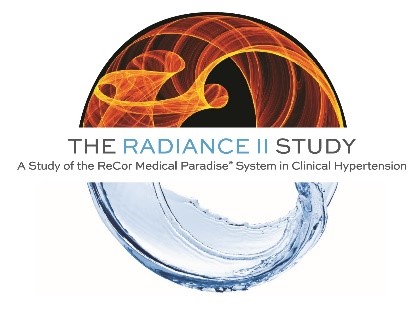 The RADIANCE Study
The RADIANCE Study
STUDY BASICS
Are you struggling to control your blood pressure? Are you 18-75 years old? If so, you may be eligible to participate in a research study to help find out if the investigational Paradise® Renal Denervation System can safely lower blood pressure and reduce your need for blood pressure medications.
STUDY PURPOSE
High blood pressure, also called hypertension, is a common health condition that increases the risk of heart attack, stroke, and other health problems. Medications and lifestyle changes can help lower blood pressure for some people, but they do not work for everyone. Although the cause of the condition is often unknown, studies have shown that some cases of high blood pressure may be a result of overactive nerves surrounding the blood vessels leading to the kidneys. Disabling these nerves by renal denervation—a procedure in which a catheter is placed inside the blood vessels and creates heat—is being investigated to see if it can lower blood pressure. The purpose of this study is to help researchers find out if a one-time, minimally-invasive procedure with the investigational Paradise® Renal Denervation System, can safely and effectively lower blood pressure.
COULD THIS STUDY BE RIGHT FOR YOU?
- Ages 18-75
- Have been prescribed a medication for your blood pressure by a physician
- Have an average systolic blood pressure (top number) of greater than 140
- Have not been diagnosed with type 1 diabetes (type 2 diabetes is OK, if the condition is controlled)
WHAT PARTICIPANTS CAN EXPECT
Participation involves several tests, including wearing a blood pressure monitoring device for a full day, as well as having pictures taken of the blood vessels going to your kidneys, called magnetic resonance angiography (MRA) or computed tomographic angiogram (CTA). These pictures will tell your doctor if your kidneys and blood vessels going to the kidneys are acceptable for treatment. Eligible participants will be randomly assigned (like the flip of a coin) to receive renal denervation or to only have a diagnostic procedure that looks at the blood vessels leading to your kidneys, you have a 2 to 1 chance to be assigned to the renal denervation. If you are not assigned to receive renal denervation, you may be able to have the procedure following 12 months of observation if your blood pressure is still high. This study involves multiple visits, and procedures including blood and urine collection, electrocardiogram, pregnancy test, physical exam, questionnaires, and full-day blood pressure monitoring, and non-invasive imaging scans. Participants will be reimbursed up to $50 per visit for travel and expenses.
 https://pittplusme.org/study/1429
https://pittplusme.org/study/1429
